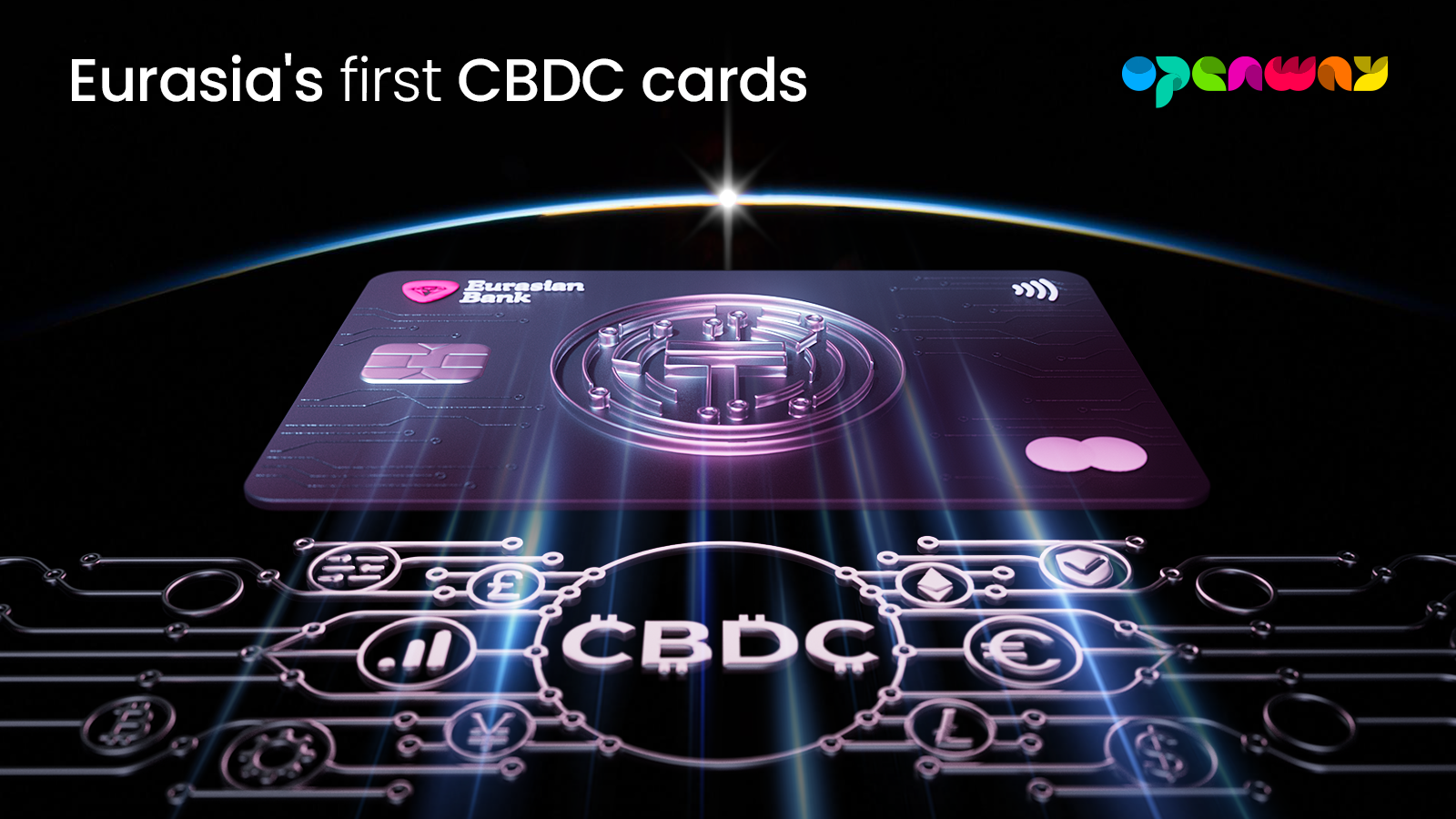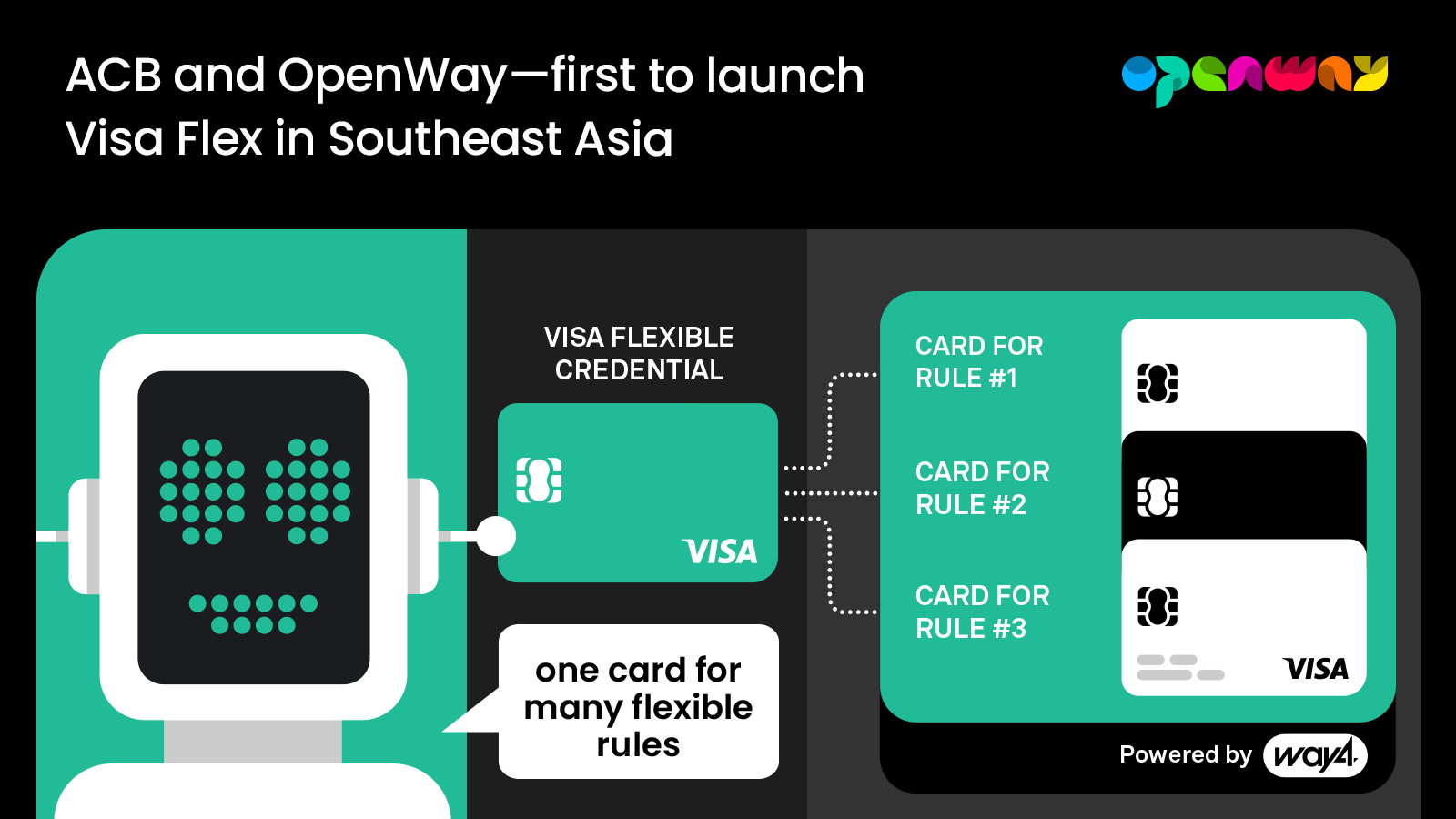De-virtualization of CBDC: what does it look like?
Few can claim to have handled a tangible object associated with Central Bank Digital Currency (CBDC). Have you ever heard someone saying: “The hotel checkout was really fast — I just tapped my CBDC card”?
Today, more than 130 countries, representing 98 percent of global GDP, are actively researching CBDC, and many have already launched it, either in pilot or in production.
Typically, consumers operate their CBDC funds only through web and mobile interfaces. The virtual form factor is so prevalent that the adoption of the digital yuan, the world’s largest CBDC pilot, is often assessed not by user count, but by the tally of virtual accounts open – “261 million digital wallets”, as shared by China’s central bank officials in 2022.
But in a few countries, consumers are lucky to also be offered a more tangible payment instrument – a plastic card linked to a CBDC account. These cards serve for both in-store and online purchases, and even facilitate international transactions.
Fully launched CBDC card initiatives number just a handful. A project was launched in the Caribbean in 2021 and another in Africa in 2022. Eurasia joined the list in 2023 when Kazakhstan unveiled cards linked to its CBDC – the digital tenge currency.
The first CBDC card transaction in Eurasia was successfully made on November 15, 2023. It was a contactless payment on POS using a card issued by Eurasian Bank JSC on the Way4 digital payments software system.
CBDC for cross-border payments, programmable money, and DeFi
A report by the International Monetary Fund issued in late 2023 revealed that “about 60 percent of emerging and low-income countries see financial inclusion as one of the top three motivations for issuing CBDC”. But in Kazakhstan, financial inclusion is not a pressing issue: there is already an impressive ratio of four payment cards per resident, totaling approximately 75 million cards in circulation in 2023, according to Forbes.

Kazakhstan’s CBDC endeavor, known as the Digital Tenge project, is pursuing several ambitious goals aligned with the government's broader economic and social development agenda:
-
To intensify cross-border trade relations. The government’s digital currency is being adapted for wholesale cross-border payments, ensuring near-instant speed and reduced costs for such transactions. The National Bank of Kazakhstan (NBK) has already conducted successful trials of cross-border CBDC transactions with the Hong Kong Monetary Authority.
-
To launch innovative social and anti-corruption initiatives that leverage the programmability of CBDC and various smart contracts. Trial use cases include the distribution of subsidies for medicine and school meals via digital vouchers; incentivizing healthy lifestyles through rewards for jogging app users; safeguarding public funds for road construction against potential misuse; and more.
-
To enable integration between digital assets issued by decentralized finance (DeFi) participants and those issued by the government. As one of many possible scenarios, NBK has issued its digital tenge stablecoins on the large cryptocurrency exchange platform Binance.
-
To expand the acceptance of the national currency beyond Kazakhstan's borders, thanks to partnerships with global payment giants Mastercard and Visa.

“We are delighted to join forces with the National Bank of Kazakhstan in further exploration and introduction of ground-breaking innovations within the Digital Tenge project”, says Rafal Trepka, General Manager Central Asia at Mastercard.

“The launch of the world's first Visa cards linked to the digital tenge is a big and important step for the development of Kazakhstan's cashless economy”, commented Cristina Doros, Vice President, Regional Manager Central Asia and Azerbaijan at Visa.
MVP in production: interoperability of CBDC, banks and card networks
Before launching the digital tenge, Kazakhstan’s National Payment Corporation invited payment experts throughout Kazakhstan and international independent advisors to study various CBDC architecture models advocated by esteemed institutions such as IMF, BIS, European Central Bank, Central Bank of Singapore, and others. It was confirmed that the stability and maturity of Kazakhstan's banking system would enable the country to leverage existing technological frameworks instead of building the entire CBDC ecosystem from scratch. It was decided that digital tenge would be issued and redeemed centrally by the regulator, while reputable market participants would open digital tenge accounts for individuals and legal entities, facilitate associated transactions, and enable seamless conversion between traditional and digital currencies.
Corda, a blockchain and tokenization platform developed by software company R3, was selected as the cornerstone of the digital tenge infrastructure. Kazakhstan’s National Payment Corporation is adapting this platform in accordance with the Digital Tenge project roadmap and creating APIs for other participants, including banks.

Binur Zhalenov, the CEO and Board Member of Kazakhstan’s National Payment Corporation, is confident that second-tier banks in the country “are attuned to the needs and responses of the clients and end-users. It is they who create the final products. Our task is to create an instrument, a so-called Lego block, to allow them to create useful products.”
In Kazakhstan, commercial banks achieved a rapid and smooth entry into the CBDC initiative thanks to their infrastructure that was modern, flexible, and capable of quick integration. The country stands out in this regard. Over the years, many banks here have embraced OpenWay’s Way4 software system to become pioneers in payments innovations: for example, the first-ever UnionPay cards issued outside of China and the world’s first mobile Visa P2P transfers. Today, Way4 powers card issuing and acquiring innovations for many members of the digital tenge ecosystem: National Payment Corporation of Kazakhstan, Eurasian Bank, Altyn Bank, Halyk Bank, and national postal service Kazpost.
Of these, the three commercial banks integrated their card processing system with the Digital Tenge platform in just six weeks with the help of their integration partner OW Kazakhstan. Now their well-established brands and mobile apps are promoting the new digital currency and accelerating its adoption. By the end of 2023, these three banks succeeded in onboarding 72% of all CBDC cardholders in the country and were processing 75% of all card transactions in digital tenge.
Popular digital tenge services offered by banks
The list of digital tenge services launched by Eurasian Bank, Altyn Bank, and Halyk Bank includes:
-
Opening a digital tenge account on the government’s digital tenge platform for an individual or legal entity
-
Issuing a virtual Mastercard or Visa card linked to the digital tenge account
-
Processing card payments in digital tenge on POS terminals, both closed-loop and open-loop transactions, with real-time conversion from digital tenge to regular non-cash tenge
-
Cash withdrawals in digital tenge across the bank’s own ATM network
How members of the digital tenge ecosystem differentiate their offering
The flexibility of the Way4 system allows each bank to craft its unique CBDC offering. The scope of digital tenge services differs among participants. Here are a few examples:
-
Eurasian Bank and Halyk Bank issue plastic cards linked to the digital tenge account.
-
Eurasian Bank enables an additional type of retail transactions for digital tenge cards that does not require conversion from digital tenge to regular non-cash tenge.
-
Eurasian Bank also processes P2P transfers in digital tenge between its own customers.
-
Altyn Bank is currently the only bank supporting cash withdrawals from a digital tenge account using ATMs of other banks.
-
Altyn Bank and Halyk Bank support payments in digital tenge from a legal entity to a list of individuals.
-
Altyn Bank and Eurasian Bank process e-commerce transactions in digital tenge.
Expanding the digital tenge footprint in 2024
Considering the achievements of these early-bird participants, more banks in Kazakhstan on the Way4 system may decide to join the Digital Tenge project in 2024 and rapidly launch unique, innovative digital tenge cards and services. Various roles that banks and fintechs can play in an expanding CBDC ecosystem are explored in OpenWay’s case study “What Fintechs Should Know About Central Bank Digital Currencies”.
Increasing the number of participating banks in 2024 is the first item on NBK’s to-do list for the Digital Tenge project. Other plans include exploring new scenarios for wholesale CBDC; implementing smart contracts to ensure that the level of digital tenge matches its stablecoin reserves; introducing digital tenge vouchers for education services; piloting offline payments and transfers in digital tenge for users without Internet access; and advancing other CBDC innovations.
According to Binur Zhalenov, Kazakhstan’s National Payment Corporation will make sure that the Digital Tenge project also “intersects with open banking in multiple ways. Notably, Digital Tenge accounts will adhere to Open API standards, which ensures their integration within the broader financial ecosystem. This means they can be incorporated into account aggregation schemes, enabling third-party Personal Financial Management (PFM) services and allowing non-bank Payment Service Providers to offer competitive solutions, thus broadening the CBDC ecosystem.”
The comprehensive roadmap of the Digital Tenge project and its early achievements ensure that Kazakhstan’s experience will serve as a reference for other governments designing their CBDCs. “We can shape global discourse on digital currencies, and by the time it is everywhere, it will be working successfully in our country,” forecasts Binur Zhalenov. With this project, Kazakhstan is strengthening its position on the international economic stage.
Get instant access to the Way4 brochure by filling out the form below:

Rudy Gunawan is the Managing Director of OpenWay Asia, the top-rated vendor of the Way4 digital payment software platform. He has been active in the payment industry for 20 years, serving as a consultant to businesses in the Middle East and Asia Pacific. In his current leadership role at OpenWay, he oversees the company's operations in Asia while promoting the board's strategic initiatives.
Rudy, who started his career as a process and technology consultant, is focused on people, innovation and corporate strategy. His passion is converting technology and ideas into better, everyday use.


OpenWay is the only best-in-class provider of digital payment software solutions for card issuing, digital wallets, merchant acquiring, BNPL, transaction switching, tokenization, and fleet payments, and the best cloud payment systems provider as rated by Aite, PayTech and Juniper Research. Top-tier banks and processors, as well as ambitious fintech startups, have chosen OpenWay as their strategic partner. With its unique capabilities in rich functionality, fast-to-market, high availability and better ROI, the Way4 software platform guarantees an unparalleled customer payment experience.
This article was first published by The Paypers, the Netherlands-based independent source of news and insights for professionals in the global payment and ecommerce community.


